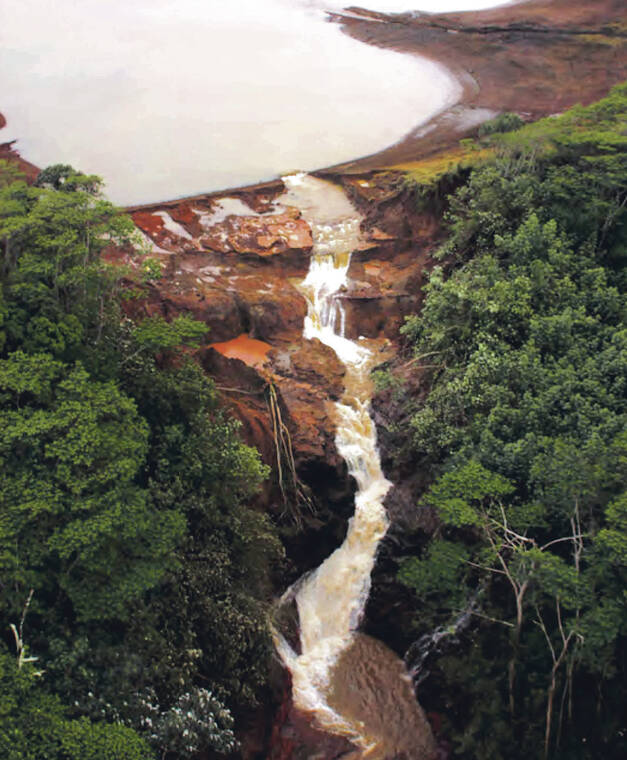A more than century-old former sugar plantation reservoir on Kauai that unleashed a deadly flood 15 years ago is now part of an enlarged domain of billionaire Facebook founder Mark Zuckerberg.
The tech mogul and his wife, Priscilla Chan, recently bought 110 acres of agricultural land that includes most of the earthen Ka Loko Reservoir that broke March 14, 2006, releasing an estimated 400 million gallons of water that swept seven people downstream where rural homes exist on Kauai’s North Shore.
Zuckerberg’s purchase follows two prior acquisitions nearby — roughly 700 acres bought for about $100 million in late 2014 and nearly 600 acres bought for $53 million in April — forming a contiguous estate on agricultural and conservation land that includes farm operations and a residence referred to as Ko‘olau Ranch that Zuckerberg and Chan call their Hawaii home.
“Mark and Priscilla continue to make their home at Ko‘olau Ranch,” Ben LaBolt, a spokesman for the couple, said in a statement.
LaBolt said Zuckerberg and Chan intend to extend farming, ranching, conservation and wildlife protection work occurring with community partners on their 1,300 acres to the recently acquired 110 acres.
Regarding the reservoir, which remains unrepaired and on the state’s list of high-risk dams, LaBolt said the couple are committed to doing their part to fulfill legal requirements and promote safety.
According to property records, Zuckerberg’s Kaloko LLC bought the 110-acre site last month for $17 million from a company owned by the kamaaina Pflueger family, whose late patriarch James Pflueger was held responsible for the 2006 tragedy for his management of the dam, a section of which burst following 40 days of near constant rain.
Pflueger was sentenced by a state judge to seven months in jail in late 2014 and was released in mid-2015. He died in 2017 at the age of 91.
Civil lawsuits brought by families of the seven flood victims and landowners who suffered property damage were settled in 2009 for $25 million by defendants that included Pflueger, the state and Kauai County along with other current and former owners of land under the dam, their insurers, engineering firms and contractors.
The reservoir was built in 1890 with gated connections to upstream irrigation ditches and was long used by sugar plantation operator C. Brewer &Co.
Today, it is restricted by the state to a monitored low-water level to mitigate risk to downstream residents and property that includes some of Zuckerberg’s earlier land acquisitions.
However, an adjacent landowner whose property includes a small part of the reservoir has produced a plan to fix the dam’s breached and eroding section with a 200-foot-long concrete spillway, while also dramatically reducing the reservoir’s capacity to 14% of its 450 million-gallon limit prior to the 2006 disaster.
The Mary N. Lucas Trust owns about 900 acres of agricultural land that borders Zuckerberg’s most recent land acquisition and some of the property he first bought.
The Lucas Trust, whose beneficiaries include relatives of Pflueger, recently became subject to liquidation under terms triggered by the death in September of 92-year-old Paul R. Cassiday Sr., who was the last living grandchild of Mary Lucas.
The Lucas land presents an opportunity for Zuckerberg and Chan to create a contiguous 2,300-acre refuge, though LaBolt declined to comment on whether the couple might want to buy the Lucas property.
Paul R. “Ricky” Cassiday Jr., a co-trustee of the Lucas Trust, said his late father envisioned the trust’s parcel in the area being sold to a good steward, but declined to comment on sale prospects.
Previously, the trust obtained county approval to create 49 land condominiums covering the entire property, which would allow the sale and development of 48 home sites on the land that is currently undeveloped and used for cattle ranching.
Zuckerberg and Chan, according to LaBolt, have made it part of their commitment as a major owner of agricultural land on Kauai to prevent future development on their property aside from their own residential use on a small percentage of the area.
Kauai County property records show that an initial 1,272-square-foot home was built in 2017 on part of Zuckerberg’s first Kauai land acquisition, which includes vast ocean frontage in the Pilaa area, with additions built in 2019.
Property records also show that the 37-year-old Zuckerberg, whom Forbes ranks as the eighth-richest person in the world with a net worth of about $120 billion, has building permits in the works for another residence on the property featuring 35,888 square feet of living space and valued at around $35 million.
Some Kauai residents have criticized Zuckerberg for actions in the rural community, such as building tall rock walls blocking ocean views from the region’s main road and employing security personnel who have been accused of harassment by some public beach access users.
Zuckerberg also drew public ire for using lawsuits filed in 2016 to force the owners of several small uninhabited parcels within his 700-acre Pilaa property to sell their land at auction.
Zuckerberg apologized for the attempted forced sale via a legal action known as quiet title, and withdrew as a plaintiff. Still, a local resident who was working with Zuckerberg and had family ties to a few of the small parcels completed a forced auction and acquired about 2 acres within the Zuckerberg and Chan estate from numerous relatives that aggrieved some, including several protesters at the auction.
But Zuckerberg and Chan also have received public praise for activities on the Garden Island.
One initiative by the couple was to create a charitable fund in their name through the Hawaii Community Foundation to support local nonprofits that do work in areas that include education, health, the environment and culture on Kauai.
Last month, Kauai Habitat for Humanity announced that it was awarded $4.85 million in grants from the Chan Zuckerberg Kauai Community Fund to build affordable housing in Waimea, Anahola and Waipouli.
“We are grateful for the support of Priscilla Chan and Mark Zuckerberg, whose vision of strengthening and empowering our community directly aligns with Habitat’s vision of providing a world where everyone has a decent place to live,” Doug Haigh, the nonprofit’s board president, said in a statement announcing the award.
At Ko‘olau Ranch, operations include a turmeric farm, an organic ginger farm, a nursery and cattle ranching. Work has also been done to protect native plants and seabird nesting, according to representatives of the couple.
Agricultural and preservation activities are slated to be extended to the property bought from the Pflueger company.
“Mark and Priscilla have worked closely with a number of community partners to operate a working ranch, promote conservation, produce sustainable agriculture and protect wildlife and look forward to expanding their efforts to include this additional property,” the statement from LaBolt said.




